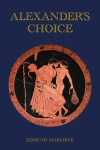Review of Enchanted Boy by Richie McMullen (GMP Publishers, 1989)
 by Edmund Marlowe - August 6, 2016 by Edmund Marlowe - August 6, 2016
- Used by permission of the author. All rights reserved.
Described by the author as written "to contribute to the growing knowledge of child abuse" and to tell "how my own experience of abuse led to me becoming a boy prostitute", I approached this memoir with some trepidation, fearing that it would be distorted with the fashionably unbalanced condemnation of all sexual experience between boys and men that has given rise to the current public hysteria and misunderstanding of it. However, it turned out that he was as good as his word in also saying "I offer no interpretations. Instead, I offer you the facts as subjectively experienced at the time ... I ask only one thing from you: That is, to suspend any judgements which this book may evoke within you."
This story of a boy's life in Liverpool aged five to fifteen in the years 1948 to 1958 is told with profound humanity. The arch-villain and author of the most serious abuse is his father, a terrifyingly violent drunk, but after recounting his qualities, Richie insists "He was a good man. ...He just wasn't able to translate that goodness into his family. ... Judge him at your peril. ... If you can, instead, love him then there is hope for all our futures."
The frankly-told sexual experiences that make Richie's story fascinating began in seriousness around his twelfth birthday when he was forcefully assaulted in bed by a hitherto admired eighteen year-old cousin. However, neither this nor the rape that followed soon after his resorting to prostitution at fourteen nor the general lovelessness of his sex life blinded him to the possibility of its being otherwise or put him off honestly recounting the one brief occasion when it was. Once, in utter despair, he picked as a punter a drunk, rough-looking "ugly son of a bitch" in the hope of being murdered, but what happened was so contrary to his expectations that finally, "I instinctively rushed across to him and threw my arms around him. ... I kissed him and made love with him there in the kitchen. It was the first time that I'd had sex and love all at the same time. It was beautiful." Sadly, he "never saw that beautiful man again."
It is interesting to compare Richie's story with that of Jack Robinson told in his memoir Teardrops on My Drum, also about a homosexually adventurous Liverpudlian boy with dreadful parents, but two decades earlier. The striking similarities serve to highlight the differences in emotional experience between the two boys. For Jack, though good for its own sake, sex had to be loving. His liaisons were the means by which he found the love, intimacy and adventure he craved, and his rich sex life reinforced his natural joie de vivre. For Richie, despite an equally strong need to find love, sex was utterly loveless with the sole minor exception noted above. He was driven to seek it by a mixture of rebelliousness and primaeval lust, and he seems to have resorted to prostitution too as an opportunity to satisfy those rather than for money he didn't really need. As a result, his sexual experiences underlined the grimness of his life rather than allowing him to escape it.
The primary explanation for these differences was that homosex for Richie was ruined by his Catholically-induced sense of its being filthy, where Jack had no hang-ups about it whatsoever. Secondly, Richie's father was a monstrous tyrant, where Jack's parents were above all neglectful, that and the earlier era in which he grew up both allowing him far greater freedom to build his own life on his own terms. If I could go back in time to give 12-year-old Richie one present, it would be a copy of Teardrops, which I suspect would have radically transformed his life by showing him a path to the much greater happiness he deserved.
Short and clearly written in an engaging style, often addressing the reader directly, it might have been better published as a single memoir with its equally short sequel Enchanted Youth.
|
